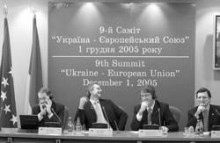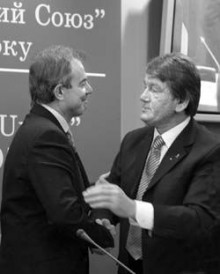It doesn’t take a Nostradamus to realize that Ukraine will not be admitted into the European Union any time soon. However, it doesn’t take a “more than a well informed realist” to turn this into a tragedy. The Ukraine-EU summit that took place on Dec. 1 in Kyiv can be regarded as a kind of reference point for building new relations between the two parties. There should not be room in them for groundless hopes, an inadequate period of time for questions, or pessimistic moods. Ukraine and the European Union are equally unprepared to join in a political marriage, although certain matchmaking procedures have taken place, without any commitments made by the parties, with the possibility that right before the “wedding” they may give Ukraine the much dreamed of “yes” or disdainful “no.” So far there are no grounds for disappointment, nothing to cause a 180-degree turn in foreign policy — from the “European integration vector” to any “alternative trends. ” The December summit marked positive symbols and signals. They were not significant and they did not mark any major breakthrough, but neither were they insignificant or meaningless. The EU wants to cooperate with Ukraine as never before. However, the majority of capital cities in the elite club of 25 European countries are not prepared to accept the idea of Ukraine’s future membership in the EU. The latest summit was marked by sobering conclusions; it showed that internal revolutions do not always lead to foreign political ones.
The new government has repeatedly argued that Ukraine is part of Europe, forgetting, however, that Ukraine is not all of Europe and that the Ukrainian issue is not always at the top of the European agenda.
The Ukrainian leadership has received a signal that not everything is lost and that all the political credit has not been exhausted. It is up to Ukraine to give an answer in the form of reliable, coordinated decisions by all branches of government, and primarily in keeping with the decisions of Ukrainians (the importance of the upcoming parliamentary elections is increasing). Much will depend on who will become the locomotive on the European integration road in Ukraine; who will demonstrate readiness to undertake the inconspicuous, routine work of drawing up documents, without slogans and promises?
TECHNICAL ACHIEVEMENTS
The prime minister of Great Britain (holding the EU presidency) Tony Blair believes that the EU-Ukraine summit was the most successful bilateral summit to date and that it will foster continuing and more powerful development of bilateral relations. “The most important thing is to establish stronger ties between the EU and Ukraine. These are relations that are based on common goals and democratic values. I am convinced that in time they will grow even stronger.” Thanking President Yushchenko, he continued, “You can rest assured that on this road to our common future in the European Union such countries as Great Britain will become your partners.” Assessing the post-revolutionary disillusionment in Ukraine, the British prime minister emphasized: Changes are a complex process. It is always difficult to respond to hopes as they are emerging. But I am certain that there are no doubts in Ukraine about the great difference that has already been observed between what Ukraine was last year and what it has become today.”
There is a striking difference in Kyiv-Brussels relations. The European Union has finally decided to recognize Ukraine as a market economy. This is a real achievement, except that it isn’t as important as it was yesterday. Ukrainian diplomats correctly point out that obtaining this status is a technical matter. Journalists, however, have attempted to “inflate” its significance. What happened on Dec. 1 looked as though an unexpected breakthrough has occurred in Kyiv-Brussels relations. They could equally portray the signing of the Ukraine-EU energy supply memorandum as the event of the year. True, the new Ukrainian government succeeded in doing what the previous government struggled over for years: it finally managed to achieve what Russia did three years ago. The EU itself seems to attach special importance to Ukraine’s market economy status.
The British prime minister declared: “Ukraine’s further prospect is clearly outlined. It consists of two elements: continuing political progress, with an eye to pushing through democratic values, freedom of speech, and rule of law, as well as economic progress, which will be facilitated by Ukraine’s status as a market economy...This is what may be called the infrastructure of both values,” said Blair.
President Yushchenko imbued this status with greater pathos when he called the granting of market status to Ukraine the summit’s “main decision. He noted that the technical procedures involved in formulating this status may take a couple of months.
Another important issue was discussed on Dec. 1: simplified visa procedures. Few people know what this issue is all about, even the diplomats who are taking part in the negotiations. The impression seems to be that the negotiating parties themselves couldn’t figure out what they were negotiating: simplified, liberalized, or improved procedures. Discussions are still taking place in diplomatic circles, even though the word “liberalization” is strictly tabooed in Brussels: citizens in EU countries might misinterpret this as the cancellation of all visas, and this could hinder the negotiating process. However, the important thing is that the negotiations have begun. Last year the very idea was considered impossible.
European Commission President Jose Manuel Barroso believes that the visa talks will be a success. “Now everything depends on the quality of our negotiators’ work,” he said in response to a question about the deadline for completing the discussion process. He told a press conference that parallel talks are underway on the visa agreement and the agreement about the readmission of illegal migrants. “If we have good will, and we do have it, then sooner or later the process will be successfully completed.”
“UNREMARKED” INTEGRATION
If one were to carry out a fine-toothcomb analysis of the results of the Dec. 1 summit, they would not seem very significant. But this may be the very feature of European integration: taking small steps on the road to big results, one of which is membership in the EU. Important decisions were reached on more issues than those that have been circulating. First, the negotiating parties signed a memorandum of mutual understanding relating to Ukraine-EU cooperation in the sphere of energy. It states that Kyiv and Brussels experts must assess the safety of our nuclear power plants. Ukraine agreed to adopt the EU’s energy legislation. The document also provides for the development of “important infrastructural projects like the Odesa-Brody pipeline with an extension to Plock in Poland. The signatories remembered to include clauses about improving effectiveness, safety, and environmental protection in the coal-mining sector.
Second, the European Union signed a civil aviation cooperation agreement with Ukraine, whereby European airlines can now use any air routes between EU countries and Ukraine. In late September the European Commission proposed to negotiate a complex civilian aviation agreement in order to create joint airspace. Such talks are aimed at gradually integrating Ukraine’s aviation industry into European structures. The commission expects to receive a mandate to start negotiations during Austria’s presidency (the first half of the next year).
Third: on Dec. 1 a cooperation agreement was signed within the framework of Galileo, the European Satellite Navigation System. As Jacques Barrot, EU Commissioner for Transport, noted, “Ukraine is one of only a few countries that have accumulated a great deal of experience in the technological sphere of global satellite orientation, which is why its participation is an important step for the development of ‘Galileo’ as an international program.” It is noteworthy that to date the EU has signed this document only with China and Israel.
EU HAS “SETTLED DOWN” IN ODESA
Another small-scale integration event took place in Odesa last Wednesday, when the city witnessed the opening of an EU mission to provide assistance on the Ukrainian-Moldovan border. The opening ceremony was attended by EU High Representative Javier Solana and Commissioner Benita Ferrero-Waldner. Ukraine hopes that the EU commission’s endeavors will be an important component in settling the Transdnistrian conflict.
This commission’s activity is slated for two years with the possibility of an extension. Its projects include on-site training courses and consulting for Ukrainian and Moldovan bureaucrats in order to boost the effectiveness of their border and customs control services.
The background of this undertaking deserves special mention. Most experts in the West did not believe Ukraine’s assurances about the strength of its border with Moldova. In June 2005 President Yushchenko and his Moldovan counterpart Vladimir Voronin asked the EU to establish a special monitoring mission to observe the performance effectiveness of border guard troops and customs authorities, who are combating contraband and human trafficking.
The guests from Brussels repeatedly stressed the “uniqueness of the event.” Ukraine has also acknowledged the importance of this bilateral cooperation. Dmytro Tkach, who is participating in the Transdnistrian settlement talks, said that the Ukrainian border guards were particularly happy to welcome experts from EU countries. They said that such missions should be set up in other border sectors (especially where Ukraine borders on Russia and Belarus). They said that their very presence would serve to enhance discipline.
Kyiv and Brussels have an opportunity to demonstrate their mutually stated friendly attitudes. Much will depend on both parties, and not just with respect to the mission. However, the lion’s share of obligations will logically fall on Ukraine, which will have to demonstrate that it is an inalienable as well as indispensable part of Europe. This fact should be demonstrated not so much to the other European states as to Ukraine itself.








